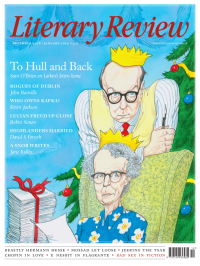Richard Overy
Won in the Post
The Kremlin Letters: Stalin’s Wartime Correspondence with Churchill and Roosevelt
By David Reynolds & Vladimir Pechatnov
Yale University Press 660pp £25
In the Kremlin during the Second World War, Stalin’s circle had nicknames for Roosevelt and Churchill. Roosevelt was ‘Captain’, while Churchill was ‘Wild Boar’. These were shrewd choices. For the Soviet leadership, it was evident that the American president wielded the real power now in the Western world as Britain struggled to cope with the demands of world war. Churchill was unpredictable, mercurial, charging hither and thither in search of a cheap strategic dividend, out of control had it not been for the restraining hand of his cabinet colleagues and military advisers.
Stalin, on the other hand, was known in London and Washington, with more affection than he deserved, as ‘Uncle Joe’. Avuncular he may have appeared to please visiting foreigners, but this was a mask to disguise the inner dictator – ruthless, self-centred and vindictive. For much of the war the real Stalin was shielded from Captain and Wild Boar, which helps to explain how the three men came to establish a measure of rapport as wartime allies that belied the fundamental differences in their backgrounds, ambitions and political practices. This owed much to the fact that the wartime relationship relied heavily on formal correspondence between the three leaders, not regular meetings. It explains why it was possible to have blind spots about Stalin. Stalin, though, had few illusions about his allies.
Much of the three-way correspondence has long been in the public domain. The Soviet authorities published a large proportion of the ‘raw’ letters to and from Stalin as early as 1957, partly to rectify what they saw as historical mischief in the West in the early Cold War

Sign Up to our newsletter
Receive free articles, highlights from the archive, news, details of prizes, and much more.@Lit_Review
Follow Literary Review on Twitter
Twitter Feed
It wasn’t until 1825 that Pepys’s diary became available for the first time. How it was eventually decrypted and published is a story of subterfuge and duplicity.
Kate Loveman tells the tale.
Kate Loveman - Publishing Pepys
Kate Loveman: Publishing Pepys
literaryreview.co.uk
Arthur Christopher Benson was a pillar of the Edwardian establishment. He was supremely well connected. As his newly published diaries reveal, he was also riotously indiscreet.
Piers Brendon compares Benson’s journals to others from the 20th century.
Piers Brendon - Land of Dopes & Tories
Piers Brendon: Land of Dopes & Tories - The Benson Diaries: Selections from the Diary of Arthur Christopher Benson by Eamon Duffy & Ronald Hyam (edd)
literaryreview.co.uk
Of the siblings Gwen and Augustus John, it is Augustus who has commanded most attention from collectors and connoisseurs.
Was he really the finer artist, asks Tanya Harrod, or is it time Gwen emerged from her brother’s shadow?
Tanya Harrod - Cut from the Same Canvas
Tanya Harrod: Cut from the Same Canvas - Artists, Siblings, Visionaries: The Lives and Loves of Gwen and Augustus John by Judith Mackrell
literaryreview.co.uk